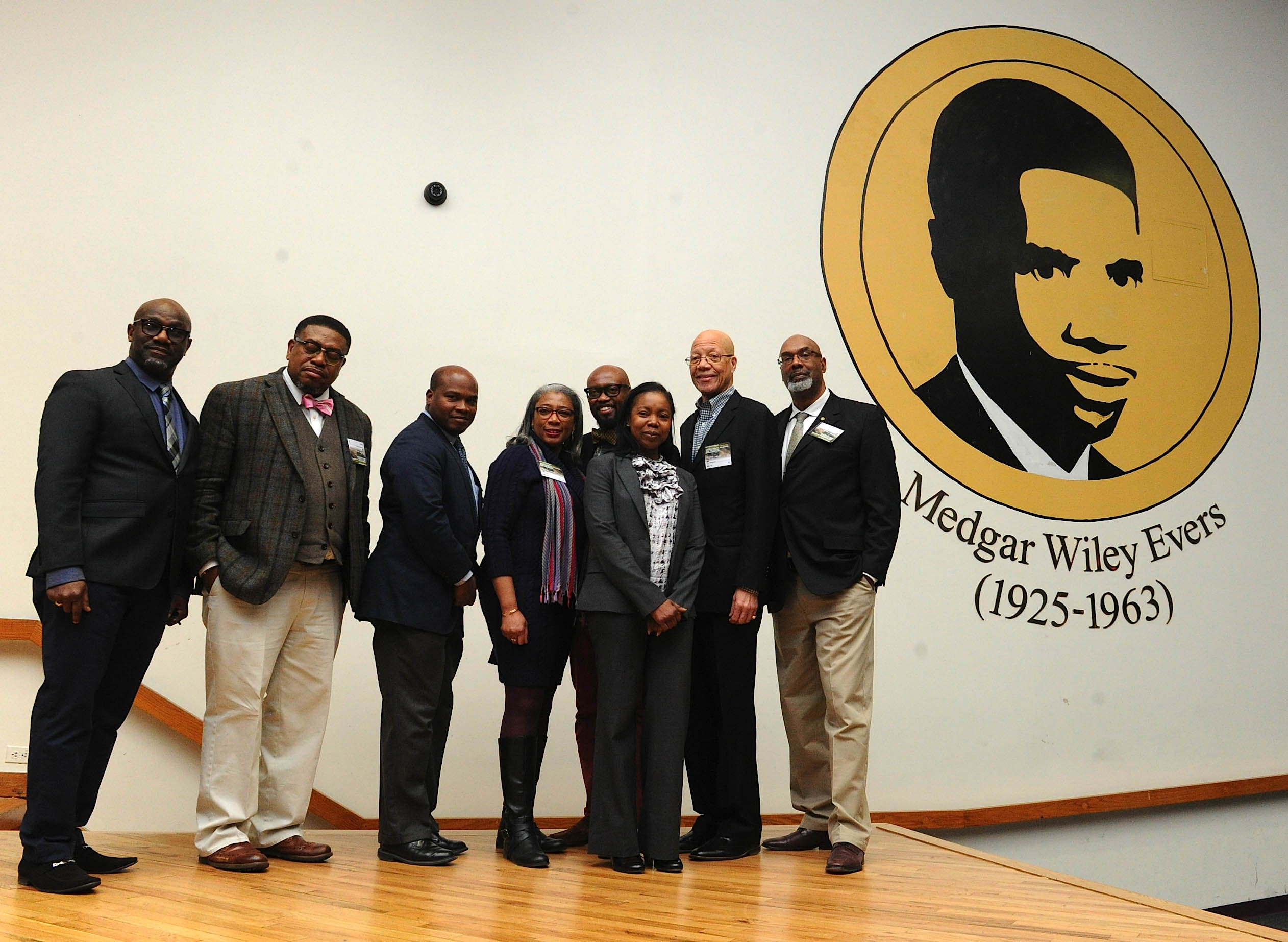Community News
Top Environmental Scholars, Justice leaders at MEC: Communities of Color Have a Few Years To Turn Tide …

… on Matters of their Health, Welfare and Life & Death
So, you think all this stuff about the environment has nothing to do with you; it’s just stuff?
Think again.

Peggy Shepard, co-founder and
executive director of WE ACT for
Environmental Justice, fought
successful battle for grassroots.
According to some of the nation’s leading environmental and social science scholars – speaking at Medgar Evers College’s SRO 23rd annual conference on environmental issues, last week – paying or not paying attention to the nation’s environmental issues and policies will determine if our children have a future.
The conference, themed “Environmental Disasters and the Urban Infrastructure,” was unique in that hundreds of young people – from middle school to college age – were in attendance and heard messages that not only warned of the dangers to come if they don’t understand how environmental policies are set; their power in making policy work for community sustainability and community survival; their responsibility in exercising their most essential power, voting; and what they can do right around them to get jobs, develop businesses and protect themselves.
Two of five key history-making activists in the global environmental justice movement – Peggy Shepherd, co-founder and executive director of WE ACT for Environmental Justice and keynoter Aaron Mair, former pioneering president of the Sierra Club, – delivered striking, personal messages that appeared to hit home. They ranged from Shepherd’s warning: DO NOT purchase anything with the word fragrance, including household products and cosmetics, to Maier’s demand, “Get involved. You only have five years to get on track with conversations about and actions against environmental racism.

Photo: Tony Akeem
Panel on The Impact of the Trump Administration on American
Environmental Policies-National and Global: From left to right, MEC Public
Administration Professor Gregorio Mayers; Peggy Shepard, co-founder and
executive director of WE ACT for Environmental Justice; Dr. John Flateau,
PhD., Professor, MEC Public Administration and Political Science and
Director, MEC Census Information Center and Commissioner, NYC Board of
Elections; and Aaron Mair, epidemiological-spatial analyst, nationally known
environmentalist, and past president of the Sierra Club.
MEC professor Dr. John Flateau warned the audience to be ready for the multibillion dollar environment-related industry and the entrepreneurial and job opportunities that are coming with it. He also urged the audiences to respond to the 2020 census. An undercount will deliver fewer services for program funding, entrepreneurism and jobs. He also noted that the future digital voting technology may work against participatory democracy, where in communities of color, there is still a digital divide: some of us who are not tech-savvy or do not own smartphones or computers may not be able to vote.
The event was chaired by Dr. John A. Gibbs, Conference Chair Emeritus and Presented by MEC’s departments of chemistry and environmental science; Public Administration and environmental science program alumni.
Peggy Shepard has successfully combined grassroots, organizing, environmental advocacy and environmental health community-based participatory research to become national leader in advancing environmental policy. Shepherd advised go to the website: not sopretty.com.
 Aaron Mair’s decade-long battle on behalf of communities in upstate New York led to a shutdown of polluting solid waste incineration in an inner-city community outside Albany, New York; a commitment by the State to close it and a $1.6 million settlement award to that community.
Aaron Mair’s decade-long battle on behalf of communities in upstate New York led to a shutdown of polluting solid waste incineration in an inner-city community outside Albany, New York; a commitment by the State to close it and a $1.6 million settlement award to that community.
Mair was also a key figure in leading the fight and securing the Sierra Club’s participation in the Clean Up of the Hudson campaign. His actions resulted in a settlement between the EPA and General Electric to dredge toxic sediments from the Upper Hudson River.

Dr. John Flateau, PhD., Professor,
MEC Public Administration and
Political Science and Director,
MEC Census Information Center
and Commissioner, NYC Board of
Elections
Dr. Flateau, a professor of public administration and political science at MEC, and director of their Census Information Center is also Commissioner of the NYC Board of Elections. He is a strategist on federal, state and local campaigns; election reform and voting rights litigation designed to empower communities of color.
Some of this country’s most dynamic leaders in the environmental justice movement can be found at MEC. The panels covered two hard topics: in the morning, the Environmental monitoring and Sustainability: trends, challenges, and plans for a more sustainable future, and in the afternoon, the impact of the Trump Administration on American Environmental Policies – National and Global.
Panel moderators included: Dr. Alicia Reid, chair, Department of Chemistry and Environmental Science, MEC; Dr. Christopher Boxe, Deputy, Chair, Department of Chemistry and Environmental Science, MEC; Professor Rhonda Binda, Department of Public Administration.
The panelists included: Jim Young Shin, Lawrence Pratt, Elmer -Rico Mojica; Dickens Saint Hilaire and Oluwaseum Salako, Joel Strothers and Professor Gregorio Mayers, Byron Price, Ms. Shepherd, Mr. Maier and Flateau.
William Washington, General Manager, Con Edison Brooklyn and Queens Electric operations, who spoke on Preparing for Emergencies, introduced by Juliet Lewis, Manager of Public Affairs for Con Edison.
Welcome and Opening Remarks were delivered by respectively, Dr. Augustine Okereke, Provost, MEC and William Washington, General Manager, Con Edison, Brooklyn and Queens Electric Operations,
Professor Wallace Ford, Chair, Department of Public Affairs MEC, introduced the keynote speaker, panels and moderators.
Also hosting the conference were Dr. Dereck Skeete, CES, MEC; who moderated the questions and answer with Maier and Dr. Terence Blackman, Dean, School of Science, Health and Technology. To view the dynamic presentations and conference highlights, visit http://www.mec.cuny.edu. To understand why we may be cosmeticizing ourselves to death, Ms. Shepard advises our readers to visit the notsopretty.com website. The event took place March 10 in MEC’s Founders Auditorium and other areas on campus.


